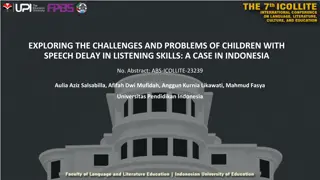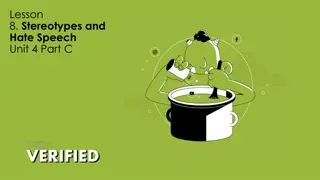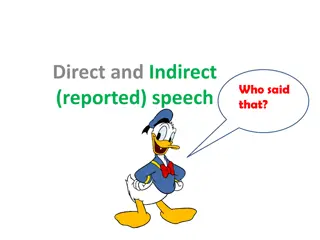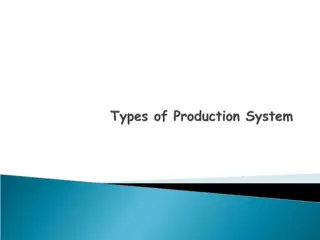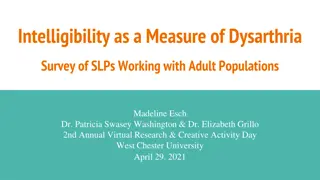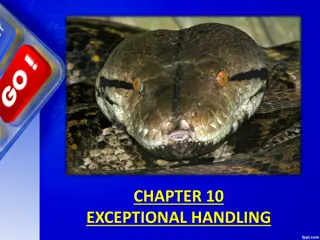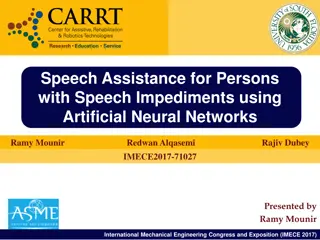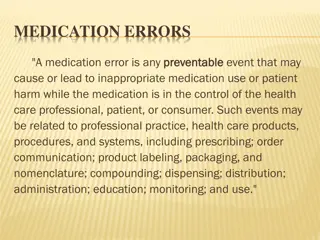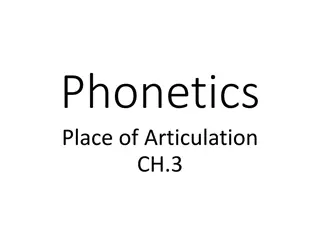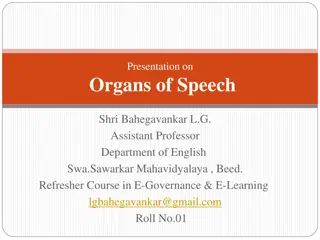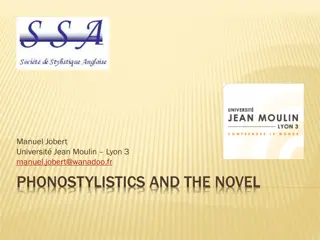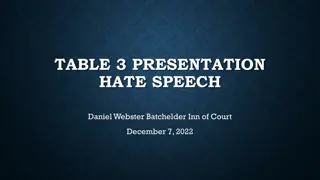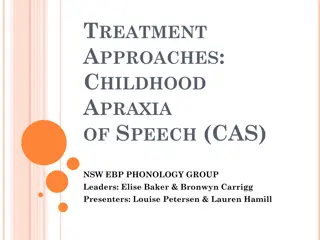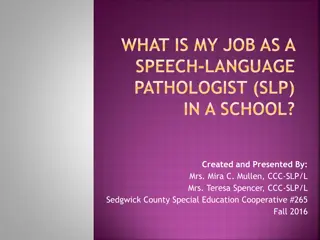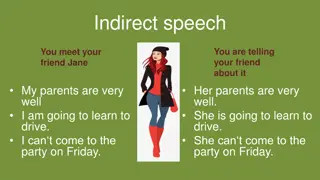Understanding Speech Production and Language Errors
Explore the intricate process of language production, including stages from conceptualization to self-monitoring. Learn about slips of the tongue, stuttering, Spoonerism, and various types of speech errors such as shift, exchange, anticipation, perseveration, addition, deletion, substitution, and blend.
Download Presentation

Please find below an Image/Link to download the presentation.
The content on the website is provided AS IS for your information and personal use only. It may not be sold, licensed, or shared on other websites without obtaining consent from the author. Download presentation by click this link. If you encounter any issues during the download, it is possible that the publisher has removed the file from their server.
E N D
Presentation Transcript
Production of Speech and Language Psycholinguistics 6thMeeting
Stages of Language Production Conceptualizing a thought Formulating a linguistic plan Articulating/implementing the plan Self-monitoring
Slips of the Tongue A speech error, commonly referred to as a slip of the tongue, is a deviation (conscious or unconscious) from the apparently intended form of an utterance. Errors in speech production and perception are also called performance errors. Speech errors are made on an occasional basis by all speakers. They occur more often when speakers are nervous, tired, anxious or intoxicated.
Charles F. Hockett explains that "whenever a speaker feels some anxiety about possible lapse, he will be led to focus attention more than normally on what he has just said and on what he is just about to say. These are ideal breeding grounds for stuttering.
Spoonerism Example of a chronic sufferer is Reverend William Archibald Spooner, whose peculiar speech may be caused by a cerebral dysfunction. Pardon madam, this pew is occupied Mardon padam, this pie is occupewed Is the dean busy Is the bean dizzy? You have missed my history lecture You have hissed my mystery lectures The Lord is a shoving leopard
Types of Speech Errors Shift: the speech unit (an affix here) moves to a different location. ex: she decides to hit it she decide to hits it Exchange: 2 units swap positions ex: Katz and Fodor Fats and Kodor Anticipation: a speech unit is activated too early. ex: take my bike bake my bike Perseveration: an earlier segment replaces a later item ex: pulled a tantrum pulled a pantrum
Addition: a unit is added. ex: carefully enough clarefully enough Deletion: a unit is deleted ex: plastic plattic Substitution: a unit is changed into a different unit ex: the place opens the place closes Blend: 2 speech units are combined ex: grizzly + ghastly grastly
Most types of errors can occur on most linguistic units Segments Segment Target Error Distinctive features or phonetic clear blue sky glear plue sky (voicing) ad hoc odd hack Phonemes or sounds spoon feeding foon speeding Sequences of sounds sure unsure Morphemes I hereby deputize you. I hereby jeopardize you. Words The sun is shining./The sky is blue. The sky is shining. Phrases
Regularities in Speech Errors Speech errors are not random Elements that interact with one another tend to come from similar linguistic environments. Initial : beast of burden burst of beaden Middle : pigeon putterdowner poojin pitter-downer final : night life [nait laif] nife lite [naif lait]
Regularities in Speech Errors Elements that interact with one another tend to be similar to one another. sesame seed crackers Sesame Street crackers (consonants exchanged with consonants - phonetic similarity) van bus (semantic similarity)
Regularities in Speech Errors Slips obey the phonological rules of the language slick + slippery slickperry (*slickppery, *slipkery) cooked a roast ([kukt]) roasted a cook ([rost d]) Speech errors reveal consistent stress patterns
Regularities in Speech Errors Perseverations (repeating previously occurring segments) are more frequent with unfamiliar phrases, anticipations with familiar ones Perseverations are more common than anticipations in aphasics than in normal adults.
Explanation of Speech Errors Freudian view: - errors occur because we have more than a single plan for production and that one such plan competes with and dominates the other. - errors reflect intrusion from repressed thoughts the slip results in a word of emotional significance (Last night my grandmother lied [died]) Psycholinguistic view: - we produce speech through a series of separate stages, each devoted to a single level of linguistic analysis. Errors typically occur at one level, but not others, during the production process. - errors reflect planning or implementation errors in normal language use
Serial Models of Linguistic Planning: Fromkin Stage 1 - Identify meaning to be conveyed Stage 2 - Select syntactic structure Stage 3 - Generate intonation contour Stage 4 - Insert content words into slots Stage 5 - Add function words and affixes Stage 6 - Specify phonetic segments
Assumptions of Serial Models Independence of planning units - most speech errors occur at only one level of planning, leaving other levels intact Stop beating your brick against a head wall. (Stop beating your head against a brick wall.) Here, only Stage 4 - inserting content words into slots - is affected
Sequence of planning units - accommodation process pronunciation of shifted elements reflects the new environment It certainly run outs fast. (runs out) [s vs. z pronunciation]
Parallel Models Multiple levels of processing take place simultaneously (Dell; Bock & Levelt) Four levels of nodes in memory: semantic, syntactic, morphological, and phonological Each node produces its own separate representation of the intended message. These representations work in parallel. Thus, as one node at one level is activated, it may activate other nodes at same or at other levels through spreading activation.
Implementing Linguistic Plans ARTICULATING Three systems of muscles: a) respiratory - regulates flow of air from lungs to vocal tract b) laryngeal (vocal cords) - responsible for distinction between voiced and voiceless sounds, and for pitch c) supralaryngeal (vocal tract tongue, lips, teeth, jaw and velum) - manipulate size and shape of oral and nasal cavity
Self-Monitoring of Speech Self-repairs - three stages a) we interrupt ourselves after detecting an error b) we utter an editing expression - eg uh or I mean c) we repair the utterance
Self-interruptions self-interruptions are usually made soon e.g. at first word boundary after the error. We can go straight on to the ye-, to the orange node Straight on to green to red And from green left to pink er from blue left to pink
Editing Expressions The type of editing expression used is not arbitrary (1) uh vs. oh I saw uh..12 people at the party. try to remember the exact number I saw oh 12 people at the party. try to choose a number that was approx. correct (2) that is (disambiguate) vs. rather (nuance) vs. I mean (to say opposite)



